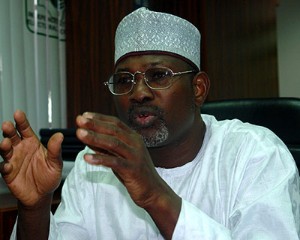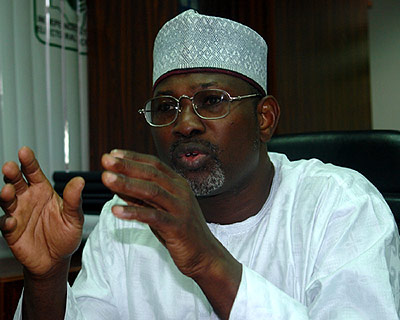Rights groups fault the peace accord signed by presidential candidates of 14 political parties, expressing concern on the recent allegation of PVC snatching from their owners and the looming disenfranchisement of eligible voters. Senior Correspondent, ONYEWUCHI OJINNAKA, recounts their concern over credible general elections this month.

The Civil Liberties Organisation (CLO), in conjunction with other civil society groups, have, under the aegis of Say No Campaign Nigeria (SNCN), faulted the peace agreement signed in Abuja by all the presidential candidates in the February 14 presidential polls.
According to the civil rights groups, the said peace pact labelled ‘Abuja Accord’ and signed by the 14 presidential candidates was uncalled for, as it does not supersede the laws of the country, such as the Electoral Offences Act, which stipulates penal measures for breach of peace in elections.
While speaking at a rally in Ikeja, Lagos State capital, to canvass for a violence-free 2015 election, one of the organisers of the rally, Ezenwa Nwagwu, said: “A ceremony of signing peace accord in Abuja can never take over the existing laws of this country. Our laws are very clear on hate speeches. We have laws called Electoral Offences Act, and so a ceremony where people sign a peace pact cannot make the law work.
“Anybody who breaches the law should be made to face the wrath of the law. I do not think an accord can settle that. An accord cannot settle the fact that someone’s house was burnt. When someone’s house is burnt, that is arson, according to our law, and it has its own punitive measures. If someone is beaten mercilessly, that is battery and assault, and our laws have punitive measures for this crime. For the fact that an accord has been signed does not mean that people should go about misbehaving.”
In the same vein, CLO Executive Director, Ibuchukwu Ezike, at the rally, stressed that violence-ridden elections have led to civil war in several countries.
He said: “We are sending this important message to the Nigerian people, to educate them that electoral violence has, all over the world, led to the killing of people and the burning of their properties, which eventually led to civil wars. We do not want such scenario in this country.”
Snatched/missing PVCs
Meanwhile, Akwa Ibom State chapter of the CLO has tasked the Independent National Electoral Commission (INEC) to re-produce the 4,503 Permanent Voters Cards (PVCs) snatched from their owners before the elections or face a strong protest.
According to the chairman, Clifford Thomas, the organisation suspects that the act was plotted by INEC and the Peoples Democratic Party (PDP), which holding sway in the state, to weaken the opposition.
Speaking with newsmen in Uyo, Thomas wondered what would be the fate of owners of the snatched cards, positing that they may be disenfranchised, to the detriment of their candidates. He expressed his organisation’s determination to resist any situation that would lead to the disenfranchisement of Nigerian eligible voters, expressing optimism that votes of Nigerians will count in the February elections with the level of awareness that has been created.
Still on the missing PVCs, Thomas has accused INEC in the state of trying to create chances for chaos. He warned that any group or individuals that seek to frustrate the efforts of Nigerians to have a credible election will be resisted.
“How would the PVCs be snatched? Is it money, even money is not easily snatched again because we are running a cashless economy. INEC should not come out and tell us this kind of story. In fact, the INEC resident electoral officer (here) should be relieved of his position immediately.
“We will not accept it. Civil society will lead a protest against that. Let the people and the person who connived go back and bring those voters’ cards. The owners deserve to have them.
“What will happen to the owners of those cards? Are they going to be disenfranchised? If they are disenfranchised, what will be the fate of their candidates?” Thomas queried.
Similarly, a Yoruba socio-political organisation, Afenifere, has warned that it will not augur well if INEC goes ahead to conduct the February general election with almost 30 million voters’ cards yet to be distributed, positing that the exercise will not be credible.
Rising from a meeting held in Akure, Ondo State, at the country home of its chairman, Reuben Fasoranti, Afenifere advised all Nigerians not to vote for any candidate who is not in support of the implementation of the National Conference report, lamenting that “as at today, over 15 million voters have not collected their cards”.
Afenifere’s Publicity Secretary, Yinka Odumakin, said: “There are 14 million voters’ cards that are yet to arrive the country. If we put them together, it is almost half of the total electorate that are yet to collect their voters’ cards.”
While reading the Afenifere communique after the meeting, Odumakin said: “The assurance by the INEC chairman (Professor Attahiru Jega) that they will distribute cards before the election is not reassuring. If he has failed to do it before now, what is the assurance that he is going to do it now?
“We want to warn that the outcome of any election conducted on the basis of disenfranchising almost half of the electorate will not be credible or acceptable.”
According to him, the meeting “viewed with seriousness the sheer incompetence on the part of INEC. The INEC that wanted to create 30,000 polling units few weeks to the election has yet to distribute almost 30 million voters’ cards. When you look at the table INEC has given, what they tell us is that in each state, this is the PVC received, hiding the total number of registered voters.
“Also, we want to warn in Yoruba land that we should be careful of those who promise change and do not believe in the restructuring of Nigeria and those who boycotted national conference and described it as diversion.
“The 2014 national conference has become a campaign issue. Anybody that did not participate in it or does not believe in it does not love our people. They want to drag them into slavery. With the report of 2014 (confab), we believe we have crossed Jordan, and are yet to get to the Promised Land. But we should not be sent to Egypt.”
In the same vein, the International Society for Civil Liberties and the Rule of Law (Intersociety) has alerted the Catholic Pontiff, Pope Francis; the UN Secretary-General, Ban Ki-moon and 11 foreign missions, expressing its anxiety over imminent danger in Africa’s most populous country as a result of INEC’s purported moves to disenfranchise 35 million registered eligible voters.
The anxiety was expressed even as the European Union Election Observation Mission (EUEOM) ascribed the problems bedevilling Nigeria’s electoral process to what it described as the failure of government to implement the election reform recommendations it prepared for the country after the 2011 general elections.
Intersociety lamented that out of the 50 recommendations it prepared for the Nigerian authorities, following the 2011 polls, only one – adoption of the Freedom of Information (FoI) law – was adopted.
However, a renowned security expert, Dr. Ona Ekhomu, has called on the federal government to postpone the February 2015 general polls in the North East states of Adamawa, Borno and Yobe, to reduce the loss of lives and wanton destruction of property, while urging the military to complete its counter-terrorism operations in the zone.
Disenfranchisement
In a detailed petition dated January 27, 2015, entitled: ‘2015 General Elections in Nigeria and INEC’s Shoddy Preparations: Chaos, Anarchy and Bloodletting Looming’, which was signed for Intersociety by the Board Chairman, Emeka Umeagbalasi; Head, Democracy and Good Governance Programme, Chiugo Onwuatuegwu; Head, Civil Liberties and Rule of Law Programme, Obianuju Igboeli; and Head, Campaign and Publicity Department, Uzochukwu Oguejiofor; the group said: “As of date, over 35 million Nigerians, most of them registered voters, have been disenfranchised by INEC. The total number of disenfranchised registered voters across the country is 30,059,085; out of which those that have not been captured in the PVCs production and delivery is 14,491,866. Those captured in the PVCs but have not received theirs till date is 15,567,219.
“Other five million eligible registered voters were also not captured during various continuous registration exercises across the country, particularly in the South East and the South West geopolitical zones. This brings the total number of disenfranchised adult voters in the country to over 35 million. There are over five million Igbo residents in the North, who are registered voters. Many of them fled the area abandoning their PVCs, following Boko Haram and Islamist Fulani insurgencies.”
Foreign missions, where the petition was addressed to, are those of the United States of America, Britain, Federal Republic of Germany, Republic of France, Canada, Brazil, Japan, Australia, China, India, and the Delegation of the European Union (EU) to Nigeria and Economic Community of West African States (ECOWAS).




